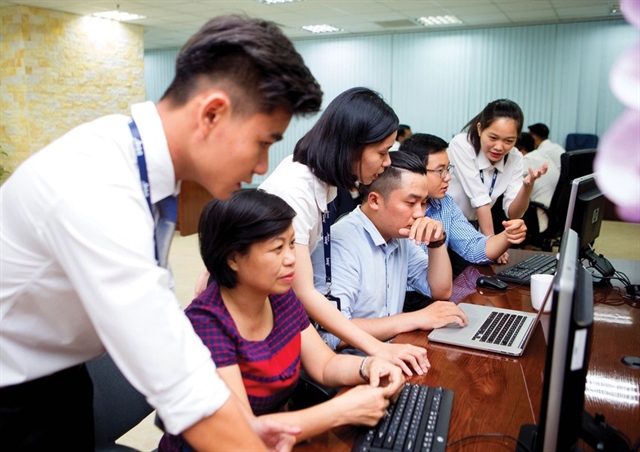Big securities companies are trying to catch up with the technological revolution in the financial industry by employing robots and artificial intelligence (AI) to provide services for their clients.

Big securities companies are trying to catch up with the technological revolution in the financial industry by employing robots and artificial intelligence (AI) to provide services for their clients.
Firms that have invested heavily in technological platforms include BIDV Securities Co (BSC), Tan Viet Securities Co (TVSC) and Techcom Securities Co (TCBS).
Early last year, BSC introduced an intelligence advisory platform known as i-Broker, which is a combination of AI and traditional analysis in the form of an online chat service for customers. Several months later, the firm launched its smart investment management service i-Invest and i-Broker - designed for derivative securities products.
TVSC followed the trend with the introduction of the Investment Robot Adviser (IRA) to bring more value to customers. This is an automated investment recommendation system with in-depth technical analysis algorithms to calculate, track trends and offer buy/sell suggestions.
TCBS is also restructuring and building a new technology infrastructure system with Open Platform, Microservices and Digital Channels to approach and interact with customers.
In Viet Nam, smaller companies are also trying to optimise their performance and cut costs in the digital age, and some have started to change their operating models.
Will robots and AI replace brokers?
Before the development of fintech (financial technology), the role of brokers was extremely important for securities companies. They performed many procedures for investors, from opening account and supporting clients with deposits and withdrawals, to forecasting market trends and offering investment advice. They also helped companies earn more revenue from brokerage fees.
In the past, a large number of brokers was a great advantage for a securities company.
Now most customers can open accounts at brokerage firms to place orders and make deposits and withdrawals online without talking to a broker.
Artificial Intelligence Securities Co (AIS) is a typical case that has no brokers, with everything conducted online and investors encouraged to make their own investments while enjoying preferential fee policies for transactions and competitive interest rates on margin loans.
In Viet Nam, more than half of the population has a bank account, equivalent to more than 45 million. As mobile devices become more and more popular, this is an opportunity for fintech securities companies.
It’s too early to predict that robots will replace humans at securities companies.
According to BSC analysts, robots could not replace the role of humans because they were programmes that could not share emotions with investors. However, the role of robots in securities investment would become more and more common in some areas of service provision. — VNS





